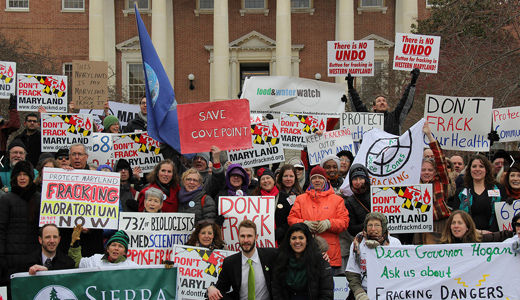
What began in Maryland on Apr. 6 – legislation imposing a moratorium on fracking – has now resulted in an official ban on the harmful practice, as on June 1, Gov. Larry Hogan declined to veto the bill. Though he did not approve the measure either, it will still become law on Oct. 1, as it passed in both the state House and Senate with over two-thirds of the vote.
The ban will remain in effect until October, 2017. In terms of victories for the environment, this one is something of a sleeper hit, with momentum now starting to build as environmental groups celebrate another triumph over dangerous natural gas drilling.
The achievement is largely credited to a local grassroots movement composed of activists and local businesses, which, according to Inside Climate, flooded their local representatives’ offices with calls and letters, and held several small anti-fracking rallies outside the Maryland State House in Annapolis.
“After months of campaigning, a bill that prohibits fracking for two and a half years passed overwhelmingly in the Maryland legislature,” said Wenonah Hauter, executive director of Food & Water Watch. “This is a testament to the growing movement to protect our community from the dangers of fracking. Conventional wisdom in the state was that we could never get a moratorium passed in Maryland, just as we were also told we could never get a ban in New York. But [the] nay saying just inspired us all to work harder.”
It’s worth noting that Hogan, a Republican, has historically been pro-fracking, remarking last year that the practice was “an economic gold mine.” Perhaps it could also be seen as an ecological landmine, if the years’ worth of devastating health effects on people and environment, and potential culpability in various earthquakes are any indication.
Meanwhile, a new EPA assessment released by the Obama administration on June 5, concluded what we already know: that there are numerous “specific instances” when fracking “led to impacts on drinking water sources, including contamination of drinking water wells.” In other words, the EPA, while still outwardly playing catch-up to scientists, activists, and environmental organizations, has finally admitted that fracking is a toxic practice.
“The EPA confirmed what communities living with fracking have known for years: fracking pollutes drinking water,” said Earthworks policy director Lauren Pagel. “Now the Obama administration, Congress, and state governments must act on that information to protect our drinking water, and stop perpetuating the oil and gas industry’s myth that fracking is safe.”
Though the report acknowledged that fracking is accident- and disaster-prone, it ultimately concluded that “we did not find evidence that these mechanisms [of contamination] have led to widespread, systemic impacts on drinking water resources in the U.S.” Despite this, the analysis at least ends the EPA’s former hypocrisy on the fracking issue, back when top officials like former administrator Lisa Jackson insisted there was no evidence that fracking had fouled drinking water, even as the EPA’s own scientists were simultaneously concluding that such pollution was occurring.
For now, Maryland can add itself to the list of states that will be spared fracking’s dirty consequences, and for that, many are heaving sighs of relief.
“Almost every week a new study emerges pointing to the alarming health and environmental effects of fracking,” said delegate David Fraser-Hidalgo, the House’s sponsor of the banning legislation. “To open up Maryland to fracking at this time would simply be reckless.”
Photo: Anti-fracking demonstration in Maryland, days prior to the governor’s decision to decline a veto of the bill that would ban fracking until Oct. 2017. | Don’t Frack Maryland












Comments